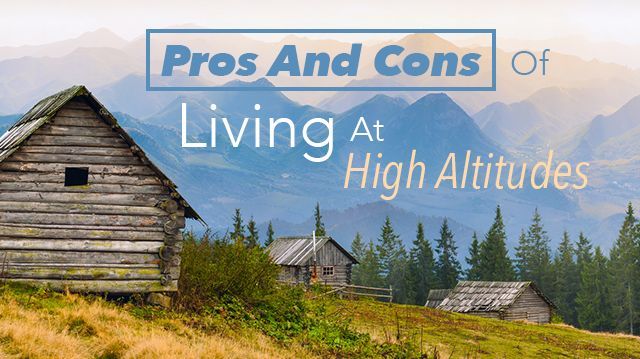
Living at high altitude has many pros: breathtaking scenery, clean air, stimulating recreational activities and definite health benefits. But with the many pros come a few cons, such as less oxygen and thin air, which can be tough on the body. Find out if living “the high life” is right for you.
Living mile high
The highest-altitude city on earth is El Alto, Bolivia. Over one million people live approximately 13,615 feet above sea level. In comparison, Mount Everest, in the Himalayan mountain range on the border of Nepal and Tibet, stands 29,035 feet tall. Alma, Colorado, the highest-altitude town in the US, is 10,353 feet above sea level and boasts a small population with only 275 residents. But any elevations 6,500 feet and above are considered high altitude.
Altitude relates to air pressure, and as altitude rises, air pressure drops. So if the altitude is high, the air pressure is low. This happens for two reasons: gravity and density. The Earth’s gravity pulls air as close to the surface as possible, and as altitude increases, gas molecules in the air decrease. The air becomes less dense than air close to sea level — “thin air” — which can be a pro and con when living in a high-altitude area.
Pro: Thin air, thin body
Instead of dieting, how about moving to a high-altitude area, where you have a 44 percent less chance of becoming obese, according to a study published in PLoS ONE. The study compared US Army or Air Force service members stationed in the United States at a high-altitude area (6,430 feet above sea level) to service members stationed at low altitude (3,215 feet). Researchers found that service members in high altitudes had lower obesity than those in low altitudes.
Researchers speculate that living in high altitudes can suppress hunger by increasing leptin and other hormones involved in appetite control — curbing obesity risk by nearly half. This may explain the findings; however, more research is needed.
Boulder, Colorado, continues to have the lowest rate of obesity in the US, at 12.4 percent, according to a Gallup Poll. In fact, Boulder has had the lowest obesity rate for almost every year since Gallup and Healthways began measuring in 2008, with the exception of 2009.
Con: Thin air, hypoxia
Unfortunately, high altitude also increases some health risks. Over 140 million people live at high altitude (that’s 7,800 feet or more above sea level), according to a study published in the Oxford Journals.
Living high above sea level subjects you to hypoxic circumstances, meaning your tissues aren’t adequately oxygenated due to insufficient oxygen in the blood. Oxygen deprivation can have severe and harmful effects on body cells that need to perform important biological functions. As a result, some people may develop systemic and pulmonary hypertension (high blood pressure in the arteries to the lungs).
Pro: Better cardiovascular health, longer life
Does high-altitude living make you live longer? Maybe, suggests a study published in the Journal of Epidemiology and Community Health. Researchers examined the link between elevation, life expectancy and mortality rates from chronic diseases for hundreds of counties in the US.
What they found was that the millions of Americans living in counties above 4,900 feet live up to three years longer than people who live near sea level. Now that doesn’t necessary mean altitude is responsible for adding years to your life. But when researchers looked at specific diseases, they did find that people (especially women) living at high altitudes were less likely to die from heart attacks.
Researchers speculate that the thinner air might be the reason why. Higher altitudes may improve cardiac efficiency, have beneficial vascular effects and be cardioprotective in other ways.
Con: Acute mountain sickness (AMS)
Most people are okay with altitudes up to 8,000 feet, which is the equivalent barometric pressure inside airplane cabins. However, even at around 5,000 feet above sea level, some people notice more breathlessness than normal when exerting themselves. Additionally, night vision may be impaired.
The most noticeable symptom of AMS is usually headache. AMS can feel like a bad hangover, suggests Altitude.org. While altitude sickness is not totally understood, most people go on to experience nausea, lethargy, dizziness, poor sleep and even vomiting. Anyone traveling to an altitude over 8,000 feet is at risk of acute mountain sickness.
Usually AMS does not become apparent until you have been at that altitude for a few hours. Part of the mystery, says Altitude.org, is that it can be difficult to predict who will be affected — it doesn’t matter how old you are or what your fitness level is.
Con: Exercising can be difficult
The effects of exercise are more intense in high-altitude living. So if you normally run 10 miles a day at low altitude, you might only be able to run six miles at a higher altitude. According to Dr. Roanne Houck, a naturopathic doctor, lowlanders may take anywhere from two weeks to three months before they begin to feel comfortable doing any kind of rigorous exercise at high altitude.
In fact, it may take almost two years for you to feel the same physically at a higher altitude than the way you feel at sea level, according to Sarah Baysden, director of Western State Colorado University’s High Altitude Performance Laboratory.
If you love the great outdoors and are considering a move to a higher altitude, keep the sunscreen handy (you are closer to the sun after all), get to know everything about mile-high living and weigh the pros and cons before you take that leap.
—Katherine Marko
Katherine Marko is a freelance writer, author and blog creator. Her areas of expertise include food, health, style, beauty, business and nutrition. Marko holds a Bachelor of Arts in English, a diploma in photography, graphic design and marketing, and certification in esthetics.
Sources:
http://education.nationalgeographic.org/encyclopedia/altitude
http://www.city-data.com/top13.html
http://journals.plos.org/plosone/article?id=10.1371/journal.pone.0093493
http://www.gallup.com/poll/168230/boulder-colo-residents-least-likely-obese.aspx?ref=more
http://ndt.oxfordjournals.org/content/27/suppl_4/iv11.full
http://www.news-medical.net/health/What-is-Hypoxia.aspx
http://www.berkeleywellness.com/fitness/active-lifestyle/article/high-altitudes-and-health
http://www.altitude.org/altitude_sickness.php
http://www.medicalnewstoday.com/articles/179819.php
http://www.denver.org/about-denver/facts-info/high-altitude-tips
http://acli-mate.com/living-at-altitude-the-pros-and-cons-of-a-high-altitude-lifestyle

